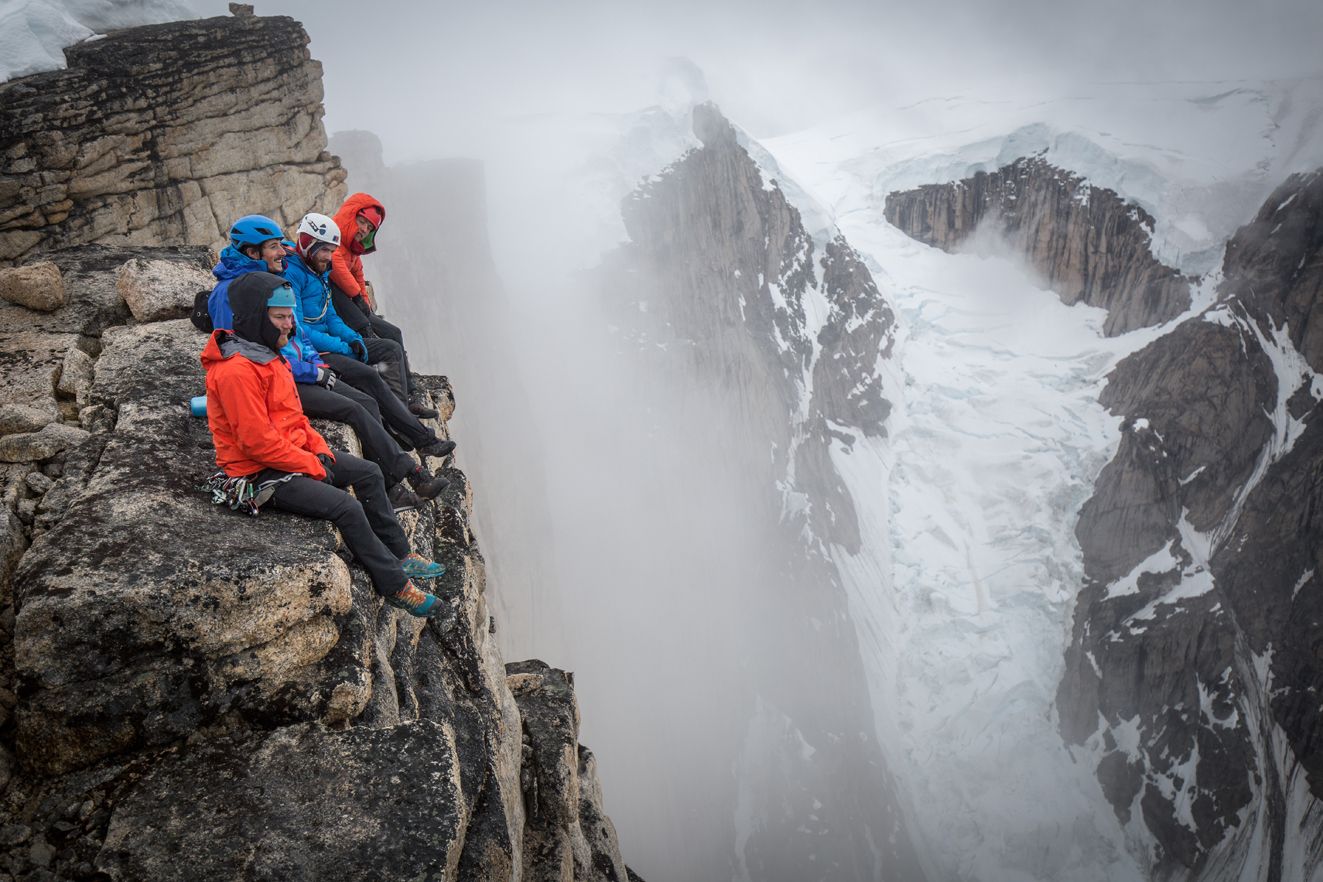
World-renowned British climber Leo Houlding and his team of five successfully established the first route up the main face of Mirror Wall in northeastern Greenland, which at 3,937 feet stands at almost four times the height of London's Shard skyscraper, on July 27.
On Monday, the 35-year-old Houlding contacted his friend Chris Lines, who manages public relations for the climber's sponsor Berghaus, saying: "We nailed it! The team has successfully climbed the Mirror Wall by the main face and descended safely. Such a huge wall taller than El Cap and so blank and smooth that you can almost see your reflection. Strategically simple, tactically highly complex - the month long process of gazing deep into the mirror looking for a way to the top is over and we found it!"
The team lead by Houlding consisted of two fellow climbing enthusiasts, 28-year-old Matt Pickles from Todmorden and 30-year-old Joe Mhle, from Switzerland, as well as Sheffield-based photo, video and drone operator Matthew Pycroft, 28, and 28-year-old climber, rigger and self-identified 'knot ninja,' Waldo Etherinton.
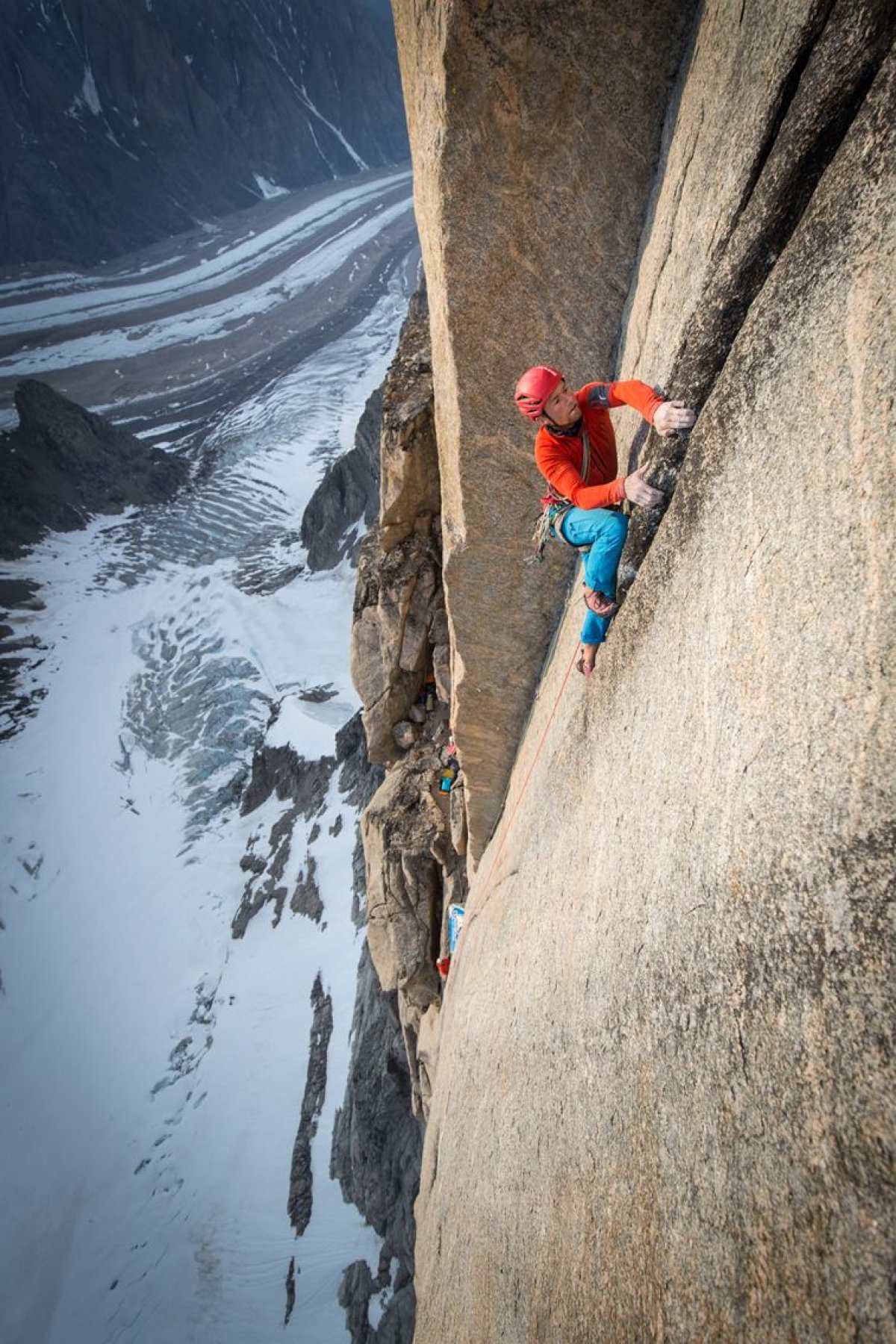
They spent 35 days in Greenland's largest fjord system Scoresby Sund, which included 15 days of climbing, 12 nights on the wall, three days of sickness and four days grounded from the bad weather. They successfully free-climbed 23 out of 25 pitches on their way to the summit. A pitch is the length between to rope anchors affixed to the rock wall, they can be as long as 197 feet of climbing rope.
Free-climbing is a style of mountain-climbing where rope and equipment are used for safety purposes but not for the climber to use to assist in the ascent. It's the primary technique used by experienced climbers. This contrasts with aid-climbing, where the climber relies on the belayed rope to scale the rock-face.
The Mirror Wall is taller than El Capitan (El Cap) in Yosemite, which stands at 3,000 feet and is considered one of the most difficult climbs in the world. Houlding free-climbed El Cap in 2010, marking "a lifetime achievement" for the native of UK's Lake District.
Although the difficulty of the Mirror Wall was comparable to climbs like El Capitan, Houlding told Newsweek the isolation of the location really added to the challenge presented by the climb, "It's interesting, when you arrive in base camp it's really intimidating. You are so far away from help in a very hostile environment, there is no infrastructure, there are no rescue services, you're a long long way from home, and you really feel it."
"Just being in base camp will be the most extreme thing many who are well versed in the outdoors will experience in their lives," adds Houlding. "Then to set out on a climb comparable to El Capitan but with snow and ice, lots of objective dangers, it is something that would be difficult and dangerous somewhere accessible."
"It really is quite profound how extreme it becomes when you're somewhere that remote. Combining the challenges of the climb with the isolation of the location makes it really intimidating," Houlding concluded.
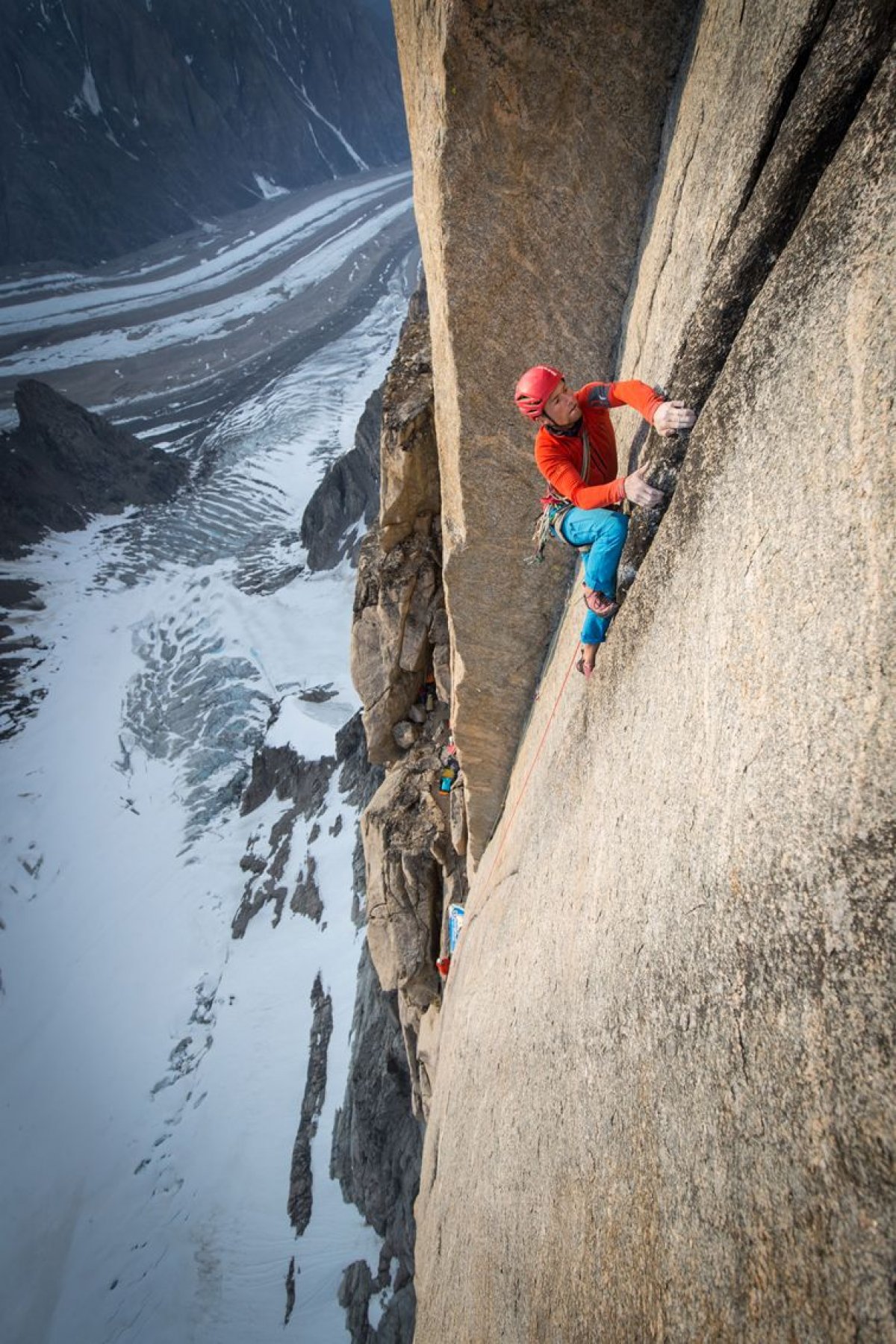
Houlding said the experience was similar to camping for a few weeks, where you have all your supplies and equipment needed, but on a vertical surface where, "you have to drag it all up behind you. So it's a two-week vertical camping trip. But it happens to be where no one has ever been before."
The second wall-camp, Arctic Hotel, was built halfway up the rock face at 1,968.5 feet on July 18. Houlding commented that this location had the "most magnificent toilet you can possibly imagine, with a view beyond words."
The climb required that Houlding drill 11 bolts into the rock face along 197 feet directly after the Arctic Hotel. Houlding said it was the largest number of bolts he had ever drilled on a climb. "With more time 98 feet of that we would have been able to free-climb, but [the other half], dare I say, would be impossible to free-climb."
The veteran climber says he experiences climbing as, "incredibly slow and cerebral. You're constantly making decisions about whether to continue or not, is this acceptably safe or not, where am I going to go, how am I going to get to that next hold, its like a physical problem-solving exercise. It's kind of like a jigsaw puzzle where you're trying to hang on by your finger tips trying to find the next piece." Not nearly the adrenaline rush some may expect.
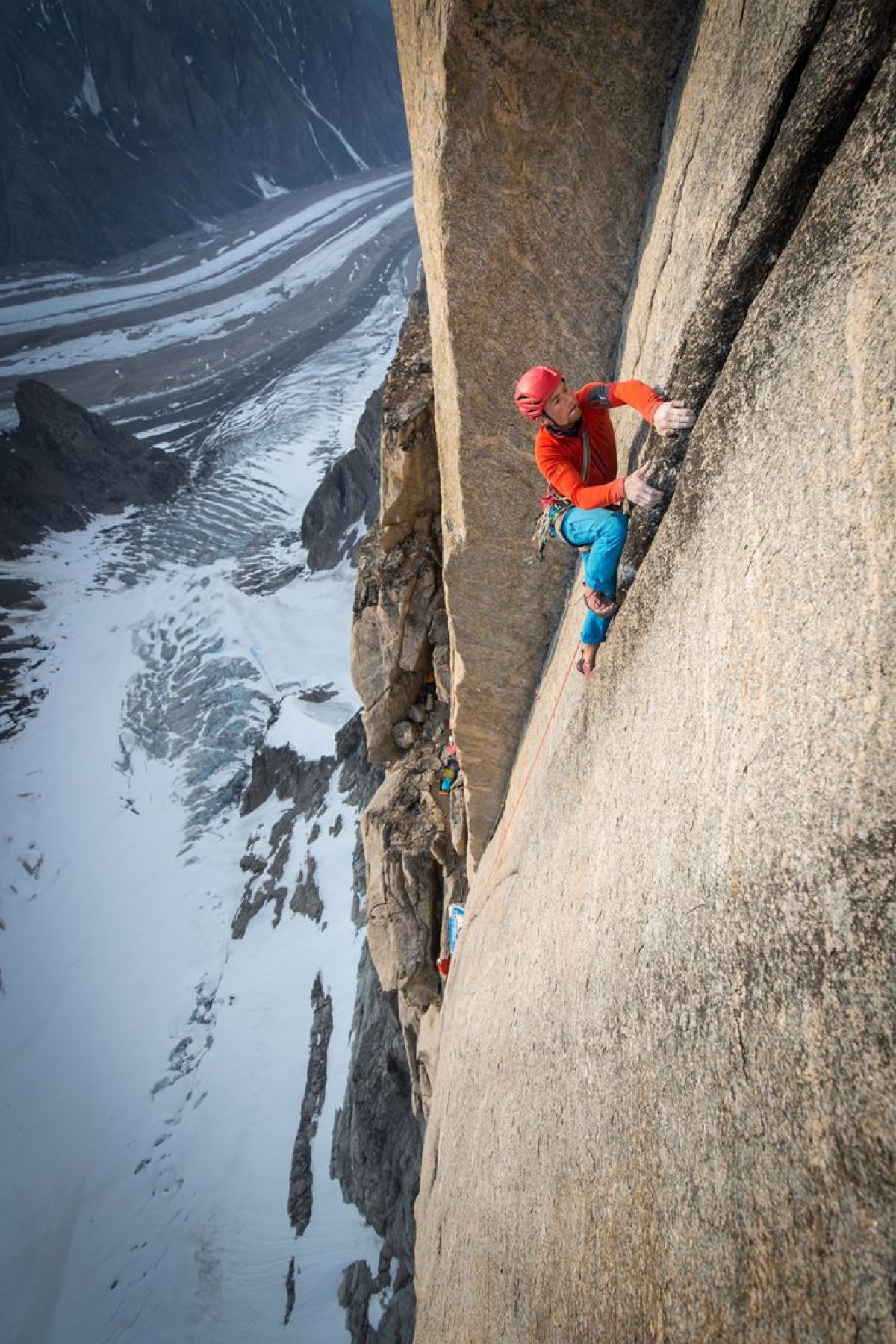
The Arctic summer weather was mild until July 10 when it became what Houlding said, "we would describe in the North of England as 'winter conditions.' It was snowing, it was sub-zero most of the time and we had absolutely every item of clothing on."
"An amazing thing happens when the wind hits the cliff and it comes straight up, so you get quite a strong updraft," Houlding says. "When it snows, in huge snow-flakes the size of a ten pence piece, going straight up it's sort of like you're in a snow dome. Really surreal experience, that's what we got when we reached the top." At 6,562 feet above sea level, "you dangle your feet off the top of the mountain and you are more than 1,000 metres above the snow in a straight line."
After the initial celebrations, however, Houlding admits that sometimes climbing can feel like somewhat inconspicuous pursuit. "We call it [being] the 'conquistadors of the useless.' You know, there is nothing there, when you get to the top there is no pot of gold, there are no dancing girls cheering for you, you just get to the top and then you come back down again."
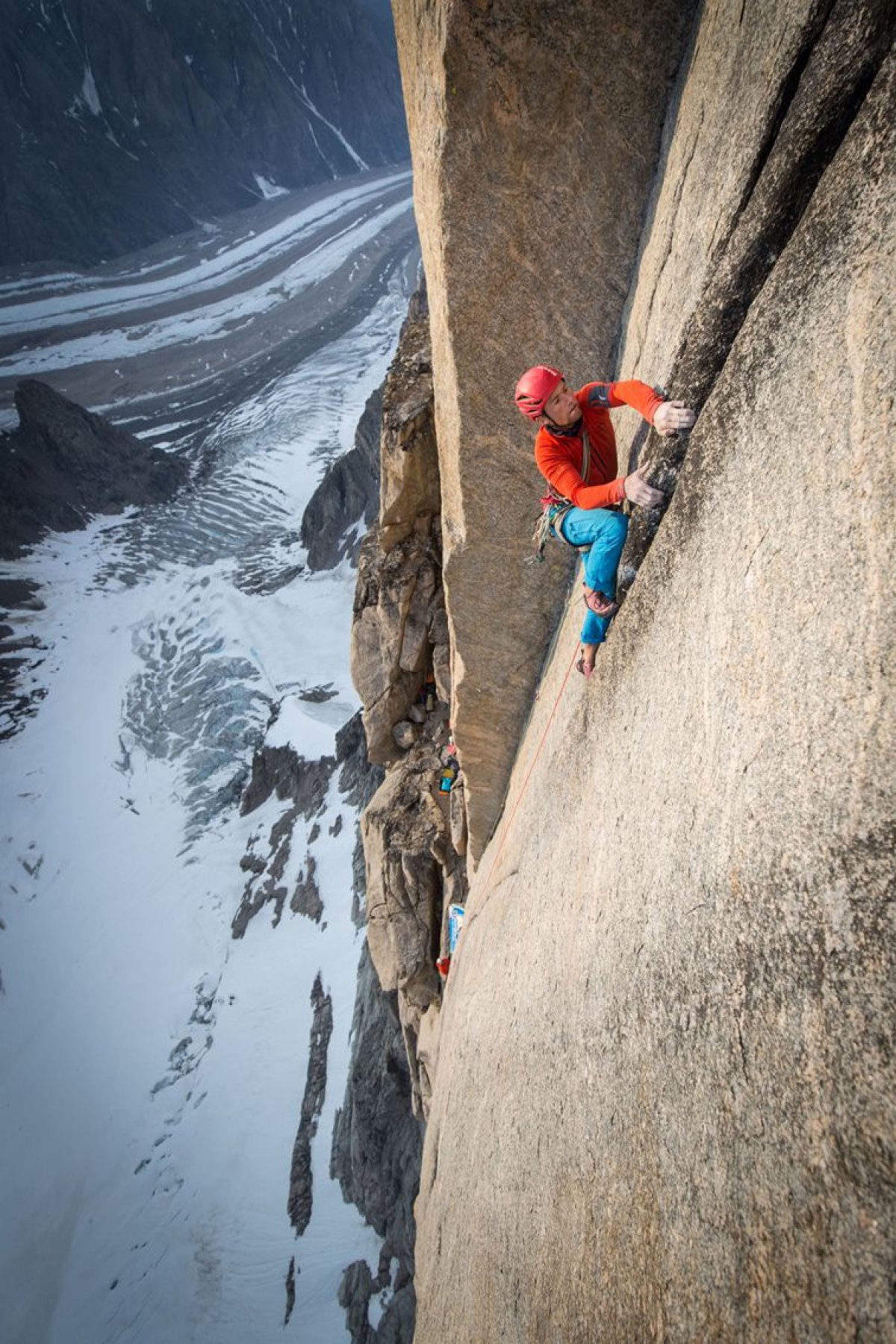
A helicopter was scheduled to be retrieved the climbers on Tuesday, Houlding's 35th birthday. From the beginning he was concerned the weather would make their evacuation difficult, and there were a few stressful hours when the glacial mist wouldn't allow the aircraft to land.
"The helicopter couldn't land so he had to fly out of communication range saying, 'I'll come back in an hour if the mist clears, otherwise if I can't pick you up in two hours I'm going to have to go.' It was a nerve wracking two hours in the mist on the glacier. Thankfully it cleared sufficiently for him to come get us, which was the best birthday present ever." Laughing, the climber continued: "There is only one flight a week from that airstrip, so if we missed that helicopter pick up we would have been stuck in a remote mosquito-infected airstrip for another week."
No major injuries or falls occurred during the remote expedition. The most harrowing thing Houlding experienced was, "the most rude awakening of my life. It was about the 5th night on the wall and we were in a hanging port-a-ledge camp on a sheer face, there was an overhang above us so it was pretty safe. In the middle of the night we were all awoken by the hideous sound of a falling rock approaching." Houlding paused for effect. "It sounds exactly like a missile, you know the piercing, whizzing sound, you can tell it's coming toward you. We all woke up. I didn't have the fly-sheet on the port-a-ledge, so I was effectively outside. It was about a fist-sized rock and it hit me directly in the balls."
Laughing Houlding continued: "Out of the blue, from thousands and thousands of feet above, it pierced straight through my down-filled sleeping bag, it felt like someone had kicked a football into my nuts. I was a bit taken aback from deep-sleep. I looked like a fox had been in the chicken house, feathers everywhere." The climber turned more serious, "If that stone had hit me in the face, it would have at least knocked my teeth out. I slept with my helmet on the rest of our time at that camp."
On choosing the Mirror Wall he said, "Going to an obscure mountain in such an obscure part of the earth almost adds to it, its even more useless, no one even knows what you're talking about. But that's what it's about, it's much more about the journey not the destination, pushing yourself in a landscape where no one has ever been before."
Houlding is happy to be back on horizontal ground with his wife and daughter, who turned two while he was climbing the wall. His next excursion into the wilderness involves "1000 miles on skis, with kites" in western Greenland. Houlding hopes to go on this trip in May 2016 as a training trip for his next project in Antarctica.
Uncommon Knowledge
Newsweek is committed to challenging conventional wisdom and finding connections in the search for common ground.
Newsweek is committed to challenging conventional wisdom and finding connections in the search for common ground.
About the writer
To read how Newsweek uses AI as a newsroom tool, Click here.






